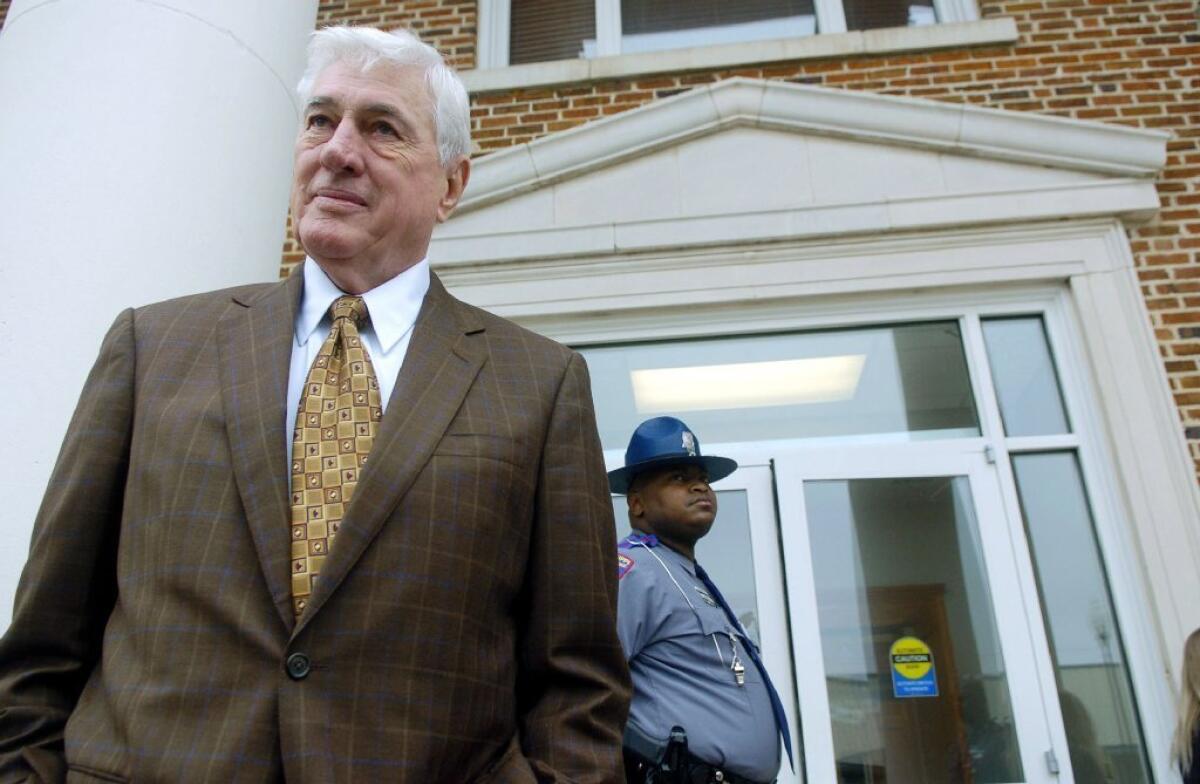Marcus Gordon, judge in the ‘Mississippi Burning’ trial, dies at 84

- Share via
The unflappable state judge who presided over the “Mississippi Burning” trial – in which a defendant accused in the 1964 killing of three civil rights workers was convicted four decades later – died Thursday.
Retired Mississippi Circuit Judge Marcus Gordon died at St. Dominic Hospital in Jackson, the state Administrative Office of the Courts said. He was 84. A cause of death was not immediately available. He had fallen and broken a hip last month.
In 2005, Gordon sentenced Edgar Ray Killen to 60 years in prison after a mixed-race jury convicted the reputed former Ku Klux Klan leader of manslaughter in one of the civil-rights era’s most notorious acts of violence – the 1964 kidnap-slaying of civil rights workers Michael Schwerner, James Chaney and Andrew Goodman in Neshoba County.
Killen was a childhood acquaintance of the judge, and from the same hometown. It was one of many connections that made the trial an intensely personal episode that divided Neshoba County neighbors and family members.
The revival of the cold case from the civil rights era also marked the first time state prosecutors had brought charges in what the FBI called the “Mississippi Burning” investigation, which inspired a movie of the same name.
Killen was convicted 41 years to the day after the killings. Two days later, Gordon – who had been a lawyer in his thirties at the time of the killings – sentenced Killen to the maximum of 20 years on each of the three counts of manslaughter.
“It is my responsibility to make that decision, and I have done it,” Gordon said at the sentencing. “Each life has value. Each life is equally as valuable as the other life and I have taken that into consideration.”
Killen, 91, remains in prison.
Born Oct. 22, 1931, Gordon grew up in the hamlet of Union, Miss., just down the road from Killen.
He was the youngest of three sons born to a barber and his factory-worker wife. As a child, the future judge was a bad student, he once told the Clarion-Ledger of Jackson, Miss.
He ended up in community college on a football and basketball scholarship. Three years in the Air Force beginning in 1951, including service in the Korean War, helped him refocus on his studies.
He eventually got a law degree from the University of Mississippi.
Gordon’s parents had attended a church where Killen preached. Killen even conducted the combined funeral for Gordon’s parents a year after the murders.
As Killen’s trial approached, Gordon, a married father of four and grandfather, received death threats. But he turned down offers of a bodyguard.
When Gordon set bail at $250,000 early in the proceedings, neighbors from the judge and defendant’s hometown put up their property as collateral to free Killen.
The trial drew international attention. During the sentencing, more than 25 armed law-enforcement officers stood against the walls of the 200-seat, oak-paneled courtroom in the Neshoba County Courthouse, with Killen’s relatives on one side of the aisle and the victims’ families on the other.
Afterward, some locals expressed satisfaction, others, anger – directed at Gordon.
Killen’s friends especially criticized the judge for not allowing the preacher, then 80, to serve his multiple sentences concurrently. Prosecutors also later alleged that Killen’s brother offered to pay undercover police officers to kill Gordon. Once again, Gordon shrugged off the alleged threat.
Mostly, Gordon was praised for his decisions in the Killen case. But the judge also faced criticism in the years following the trial, including from members of the local chapter of the National Assn. for the Advancement of Colored People. They argued that Gordon showed a leniency toward Killen at odds with his treatment of some black defendants in his courtroom. Gordon had briefly freed Killen on a bond, inflaming their outrage.
The Clarion-Ledger described the judge as 6 feet 3, distinguished-looking and “old school.” Gordon maintained to a Times reporter that the killings of the three activists “was not the act of Neshoba County. That was the act of a small, howling mob.”
Questioned at the start of the Killen case, he also remarked that he couldn’t understand why anyone would demonstrate against the United States.
But he also said his job on the high-profile case was straightforward: He said he knew “the law and my duty -- and that’s to call it like it is.”
Gordon won a hard-fought reelection campaign in 2014. He died less than three months after retiring as the longest-serving state circuit judge in Mississippi, with 37 years on the bench.
“Judge Gordon ... courageously presided over many very difficult cases, including the trial of Edgar Ray Killen,” Mississippi Supreme Court Chief Justice Bill Waller Jr. said in a statement Thursday.
Leovy is a Times staff writer; Wagster Pettus writes for the Associated Press.
ALSO
50-years-to-life sentence upheld for killer who was 16 at time of shooting
145-year-old casket with preserved toddler found beneath San Francisco home
Portland police chief put on leave after allegedly shooting friend during hunting trip






